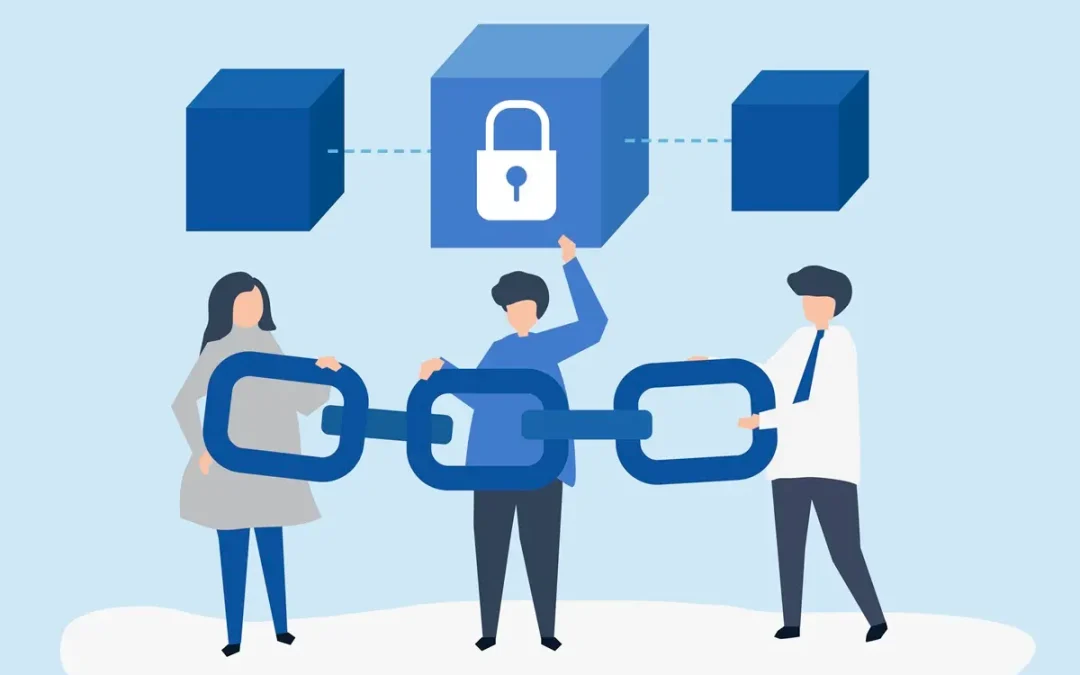Blockchain has proven itself as a revolutionary system, that has taken over the traditional systems of storing and sharing information. It has now extended from cryptocurrencies like Bitcoin to many other industries. It has given the distributed ledger system, which makes it more secure, transparent, and decentralized regarding its data management and storage. These are making blockchain the future of the digital world.
Security:
The most prominent and foremost benefit of blockchain is its security features. Blockchain has a distributed ledger system, which differentiates it from the traditional centralized database systems. As the previous systems were used to store the information in only one single location, blockchain has a distributed system. This feature of a decentralized system is very important in reducing the issue of data breaches, as there are various points instead of a single point which has more risk of being exploited by the hackers. Moreover, blockchain has proper encryption in its transactions, which makes it hard to be exploited by any unauthorized person, which protects its data from any tampering or alteration. Blockchain security also uses cryptographic algorithms, which are one of the most critical components of it. These algorithms help in verifying and securing the transactions. In public lock chin networks, there’s a grouping system that puts each transaction into one block, and it is linked to the previous block which creates a chain of data blocks. The chain becomes immutable, then a block is added to it which means that the data will not be able to alter without altering the subsequent blocks.
This process is usually known as “hashing”, which makes sure that the information is safe and integrated, and it secures the data to an extreme where it becomes difficult for any intruder to manipulate the system.
Additionally, the mechanisms like proof of work (PoW) and proof of stake (PoS) also improve security. These mechanisms require validation of transactions from the participants before they are added to the blockchain. These systems are very resource-intensive and computationally expensive for a person who tries to do any fraudulent activity. This feature increases the trust of its participants in the blockchain network.
Transparency:
Another important benefit of blockchain is its transparency. Has already discussed above it has a distributed ledger system, which enables it to give access to the same record for all participants. This helps in keeping the complete history of every transaction. It also gives accountability because all the participants are involved and they can check the accuracy of data without depending on the authorities like banks or government. Unlike traditional systems which were controlled by only a single organization, blockchain gives access to every participant in the network. Due to this feature, there is no secrecy in changing of data or any misuse of data, in this case, if anyone tries to change the transaction, it will not work as it would not match with the records. Blockchain also builds accountability, as every transaction is recorded and visible to all, they are less likely to get into any fraud.
The shared ledger system enables the participants to keep a check on transactions, hence no one can lie about any payment or details. Usually in the financial industries, the blockchain solves the problem of double spending, where the same money would not be spent twice. This builds trust between all the participants in the particular industries because they know how the money revolves in the system. Another important feature related to transparency is the blockchain provides real-time information, which is easy to order. The history of the transaction can be seen easily without relying on any second party. This also makes auditing faster and easier, because there is no need to wait for an outside auditor to verify the transactions, this not only saves time but it is also cost-effective and keeps the data up to date.
Due to all these transparent features, blockchain has been used in various industries where it is very important to keep accurate records. For example, in the finance industry, blockchain helps in keeping updated transactions which reduces any fraudulent actions and keeps the system secure. Blockchain has also helped the supply chain industry where it enables tracking the goods when they are moving from one place to another. Companies that work in this industry, are enabled to verify the standards and sourcing of products. To Make it clearer let’s take an example of a coffee company, that needs to track the products like coffee beans. Blockchain enables it to track where the beans are grown, how they are stored, how they are sold, and also every single step of the process from growing these beans to shipping them. Blockchain helps in making this complete process visible and verified.
Decentralization:
The revolutionary aspect of blockchain technology is its three centralizations. The previous systems were used to rely on the central systems like banks or governments, for the validation of data and also the management of transactions. Compared to that, blockchain has a decentralized system, where all the participants have access to the data as the control is distributed among them. This is known as “nodes” in the blockchain network. The decentralization feature has a lot of benefits, which gives blockchain an advantage. The first benefit of decentralization is that it is cost-effective and is more efficient because there is no need for any intermediaries to deal with the data. For instance, during cross-border payments, traditional financial institutions like banks were used to charge high fees and also long days for the process of transactions.
However, through blockchain these transactions are done instantly and a lot less costly than the traditional system. The decentralization has also given the benefit of resilience to blockchain. The centralized system due to its central authority if in case fails, the entire system would be affected. But, as the decentralized blockchain system has a distributed network, the failure of one node would not affect the overall operation of the system. Hence, blockchain is less likely to be affected overall by systematic risks.
The most important feature of decentralization is that it gives power to the individuals as they are given control over their data. The previous systems were used to keep sensitive information to themselves their users must have to trust the institutions with their sensitive data. This also increases the vulnerability of data and makes it grow to the bridges. Through blockchain, the users are able to access their data and keep a check on how it is used which increases the autonomy of the network and also the privacy system.
Conclusion:
The features like security, decentralization, and transparency combined together to make blockchain a system that can transform various sectors. Login has a secure system that makes sure that data is protected from any unauthorized individual, which ensures the aspect of data integrity. The transparency of this system builds trust and accountability among its users. And the decentralization makes it cost-effective while increasing its resilience and reducing any need for intermediaries. As industries are evolving in technology, the adaption of blockchain is also increasing which is giving more evidence of its benefits of innovation, and data management.
Harnessing the power of blockchain for secure and transparent solutions.
Let’s build a decentralized future together.Got time? Explore more!
Top 5 Mobile App Development Trends to Watch in 2026
A flat-design illustration of two IT professionals managing a cybersecurity interface featuring a central shield, password fields, and digital security icons.
The Next Generation of Quality Assurance Automated Testing in 2026
A flat-design illustration of two IT professionals managing a cybersecurity interface featuring a central shield, password fields, and digital security icons.
The Role of Generative AI in the 2026 Software Development Lifecycle
Three people with VR headsets analyzing a digital dashboard of business data, highlighting data-driven decision making.




